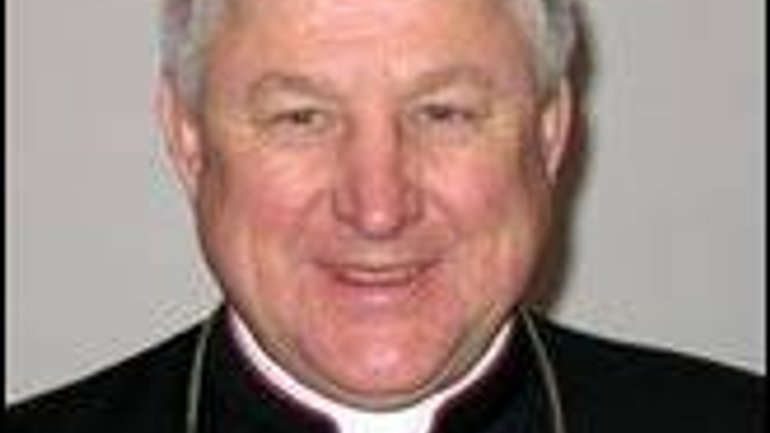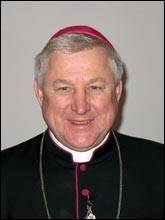Sixteen Years a Short Period to Learn the Charity Habit – Interview with Caritas-Spes Head

 Interview with Auxiliary Bishop Stanislaw SHYROKORADIUK of the Kyiv-Zhytomyr diocese of the Roman Catholic Church and President of Caritas-Spes Ukraine
Interview with Auxiliary Bishop Stanislaw SHYROKORADIUK of the Kyiv-Zhytomyr diocese of the Roman Catholic Church and President of Caritas-Spes Ukraine
Caritas-Spes organizes hundreds of social projects in Ukraine. “Caritas” means “merciful love” in Latin. “Spes” means “hope.” The mission of this internationally well-known organization, operating in 162 countries and now in Ukraine, is “to show God’s love to all and give people hope.” In Ukraine, the organization functions in 12 regions. Today Caritas-Spes Ukraine has 40 centers engaging 500 employees and volunteers.
- Bishop Stanislaw Shykorodiuk, president of Caritas-Spes Ukraine and member of the Conference of Roman Catholic Bishops in Ukraine, acquaints us with the organization’s work, sharing his views on prospects of charitable work in Ukraine.
- When Ukraine became independent and society more democratic and open, the Roman Catholic Church was presented with an historical opportunity not only to revive from ruin, build churches damaged during the years of former communist rule, but also to actively engage in charitable and socially useful work. First of all, we began our work by addressing the urgent needs of children. We were very disturbed by the problems of orphans, homeless children, and victims of the Chornobyl disaster, many of whom were quite ill. This was our main goal.
We started with simple things like tent camps. Today our organization is supporting six family-style homes for orphans where close to 60 children live. It also finances activities of health rehabilitation camp which are situated in environmentally healthful areas around the Kyiv, Zhytomyr, Ivano-Frankivs’k, and Transcarpathian regions and benefit 2,500 children each year. In the last five years, 12,000 Ukrainian children, mainly victims of Chornobyl, orphans, and children from poor families, had their health improved in this way.
Today, we work in the area of HIV/AIDS on prevention, re-socializing HIV-positive persons and caring for those with AIDS. We also operate social centers, free dining halls, medical offices, and provide care for the elderly and those with special needs.
Your Excellency, you are a bishop of the Roman Catholic Church and at the same time you are the head of a charitable organization. Do you have enough time and energy to do all of this?
- There is nothing strange in this, because the mission of the Church is not only to spread God’s word, not only to save people’s souls, but also to carry out good and merciful works. Jesus Christ began with this. When we read the Gospels, we can see that in fact he gave much attention to the sick. He performed most of his miracles for them and spent much time with them. In general, assisting the ill, both physically and spiritually, is the main theme of the Gospels.
Let’s take the parable of the good Samaritan. This is an example of the charity which the Church should engage in. Or let’s consider the times of the first apostles. The first Christian community took care of ill people, orphans, and widows. This was the mission of the Church.
Unfortunately, in Ukraine this tradition was interrupted during the former regime because the Church lost all its property and its activities were prohibited, including social and charity work. This was to be done by the state because they wanted to build communism, “paradise” on earth. And they wanted to build it without the Church.
- Our country has been independent now for sixteen years. We have a good number of elite, wealthy people. Why are we still asking for money from foreign doors?
- Sixteen years is a very short period of time for a state. We still have a lot to learn. Today we are learning a lot from our western brothers because the church returned to its former activities. The Roman Catholic community in Ukraine is very small, but in the world, the Catholic Church is the biggest. If we take a look worldwide, we see how developed church structures are in the West, for example, in France, Austria, and Italy. In general, churches there have their own hospitals, homes for the elderly, and orphanages. They are co-working with the state and the state helps them.
But today, it would be very hard to compare charity work in Ukraine with similar work elsewhere. And the problem is not just a cultural one. If today someone in Ukraine wants to become active in charity work, the person will encounter a variety of roadblocks. Thus, if one really wants to embark upon this, they need some extraordinary motivation – God’s calling. And one gets the impression that the government is not at all interested in citizens’ desire to help fellow citizens.
It is unclear why charitable organizations in Ukraine, for example, orphanages, are equated with commercial structures. They pay the same tariffs for public utilities. There are no discounts or tax breaks as in some other countries. Today, the Ukrainian government is more occupied with taking from the Church. This is a really serious problem.
It is the opposite abroad, where governments do all in their power to facilitate the work of the church and charitable organizations. They understand that many social problems are alleviated this way.
- You are nevertheless active in this work. How do you obtain funds for your activities? Is there any help from abroad?
- Our work continues only through the help of people of good will who are believers and think of charity as a calling from God. These good people are not only from Ukraine, as unfortunately those willing to donate money in Ukraine are not many. Our nation is poorer than some others, but our believers are helping us in good projects. But the majority of people who help us are those from abroad who come here and see our problems as well as what we are doing about them. They trust us. From our side, we always report to them how money has been spent.
Are these people Catholic? In general, what is the attitude of your organization towards needy people of other confessions ?
- Our church, through its charitable work in the social sphere, has an ecumenical mission. When helping others, there is never a question about who a person is, or what their belief is. Is he or she a Catholic or even a Christian? This is service because of love towards a human being. It does not depend on his or her faith and views. This corresponds with Christian teachings and teaching of the Catholic Church. It can not be otherwise because this brings unity, not separation. When people of other confessions see that their children are being helped, they do not want to look for theological differences. Such Christian love builds bridges between people and encourages trust between confessions. This is wonderful; it falls in line with our goals.
In Ukraine the word “charity” is associated with the word “give!” Abroad it’s the opposite – they use the popular expression, “it is better to give than to receive.” What is the basic difference between these approaches to charitable work?
- There is no other true way except the one described in the Holy Bible. The Old and New Testaments teach a person to donate one tenth of what they have for God’s work. I often visit Germany, France, and other developed countries. Christians there consciously donate one tenth of their incomes for charitable work and good deeds. By the way, giving does not depend on income. If this person is rich and prosperous, you can imagine how much he or she can help. The notion of volunteering is also very developed there. Many people that can not donate money for activities are donating their time. They say, for example, I can work two hours per week without payment. There are a variety of people working in a variety of professions and fields which volunteer their time in this way.
For example, in France there are more than 100 dioceses. Every diocese has a Caritas-Spes. It is clear what kind of strength this adds up to. Though only a couple thousand people are employed officially, more than 70 thousand volunteers are involved, either in orphanages, homes for the elderly, rehabilitation centers for people with special needs, etc. There are also differences, however. In Germany, for example, more people are officially working for Caritas; fewer of them are volunteers. At any rate, the volunteer movement in Germany is very strong. This is because volunteerism is highly regarded. It is not because somebody gains an advantage from this. A person can have a clearer conscience, a feeling of being involved in God’s work, an understanding of oneself as a real human being that is needed by someone.
And in this way, from generation to generation, such an upbringing is passed on - from parents to children. In this way, people receive God’s blessing.
In closing, I would like to add a word: our entrance into Europe has great prospects. Whether we like it or not, our legislation with time will by all means approximate to that of Europe. Then it will be easier to be involved in charitable work and social issues will be resolved more effectively. People will more and more turn their eyes to God, and He will generously bless our Ukrainian land.
Alexander Kozlovs’ky (Ukrinform) conducted this interview in Kyiv exclusively for RISU. The story was posted on RISU’s Ukrainian-language webpage on 18 August 2007.









